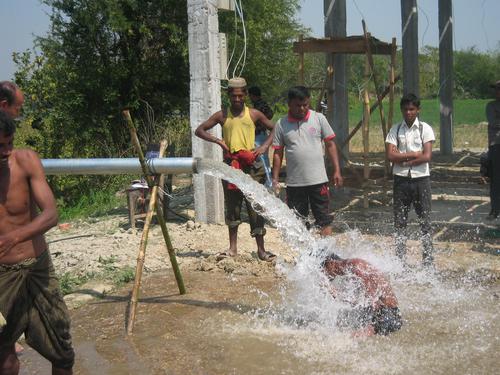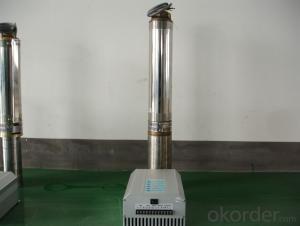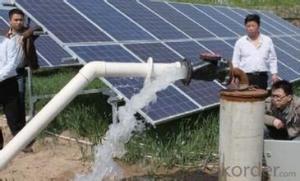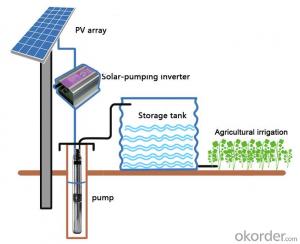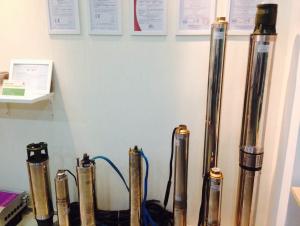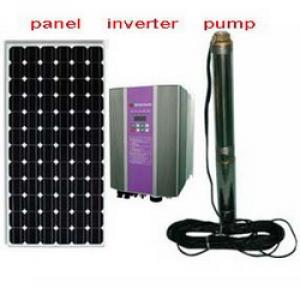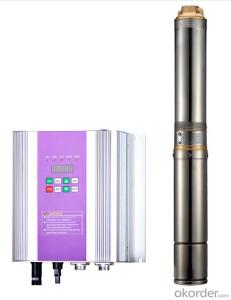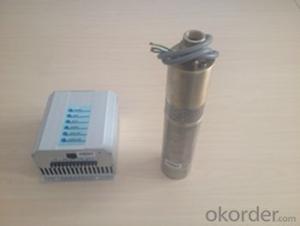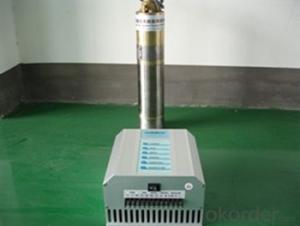Kusum Solar Pump - DC Solar Pumping Systems Popular Type Good Quality
- Loading Port:
- Shekou
- Payment Terms:
- TT OR LC
- Min Order Qty:
- 10 set
- Supply Capability:
- 6000000 set/month
OKorder Service Pledge
OKorder Financial Service
You Might Also Like
Products
DC Solar Pumping System can be applied to daily use (ground water), agricultural irrigation, forestry irrigation, desert control, pasture animal husbandry, water supply for islands, wastewater treatment engineering, and so on. Solar water pump System is dispensed with energy storing devices, and stores water instead of electricity. It improves the reliability of the device, at the same time, it lowers the construction and maintenance costs of the irrigation system dramatically.
In recent years, with the promotion of the utilization of new energy resources, Solar Pumping System is more and more used in municipal engineering, city centre squares, parks, tourist sites, resorts and hotels, the landscapes and fountain irrigation systems in the residential areas.
Technical Features
Optimization of Single Pump System
A single solar irrigation system consists of only one pump, a power -matched solar array and an inverter . The aim of optimization is to reduce the amount of PV modules as much as possible on the premise of filling the requirement of head and capacity. The rotational speed of pump is regulated according to the irradiation on the solar array; when the sunlight reaches its peak, the pump runs at the rated speed, and the output approaches the peak power of the solar array; when the sunlight is less abundant, the speed of pump varies bellow the range of the rated speed; when the speed as low as the capacity becomes zero, the solar pumping system stops working. So, there are big differences between solar irriation systems and traditional pumping systems in system design, and the system should be optimized according to the requirements of head, capacity, and local conditions of sunlight.
•Determine the optimal average daily operating time and the range of speed governing.
•Choose the optimal head and capacity of the pump.
•Determine the maximum power of PV modules, the best working voltage and method of connection.
Optimization of Multi-pump Systems:
There are several pumps in a multi-pump system. The pumps can be driven either by only one high-power inverter, or by several matching inverters. In the case of large capacity demand, the operation of the multi-pump system is more flexible. By switching solar arrays and pumps, all of the pumps run in MPPT mode when the sunlight is abundant, while some pumps will be shut down and all solar arrays supply power intensively for the rest running pumps when irradiation is weak. Based on the optimization of single pump system, the range of speed can be further optimized, and the photovoltaic(PV) pumping system always works with high efficiency.
Product Specifications
Model | Rated Power | Max. Flow | Max. Lift | Daily Water Supply | Outlet Dia. | Pump Dia. |
PSD600C | 600W | 4.5 m3/h | 30 m | 10 - 20 m3 | 1"1/4 | 4" |
PSD600H | 600W | 2 m3/h | 100 m | 5 - 10 m3 | 1"1/4 | 4" |
Solar Array Configuration
Max. Input Power | Max. Input Current | Max. Open Circuit Voltage | Recommended MPP Voltage |
1000W | 15A | 150VDC | 60 - 120VDC |
Recommended Design | Solar Panel | Connection | Total Power |
Configuration 1 | 190W / 35Vmp | 2 pcs x 2 strings | 760W |
Configuration 2 | 250W / 30Vmp | 3 pcs x 1 string | 750W |
Performance Curve
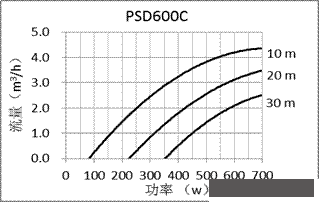
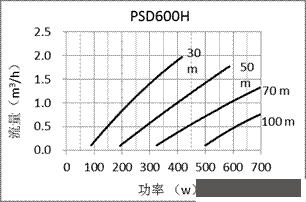
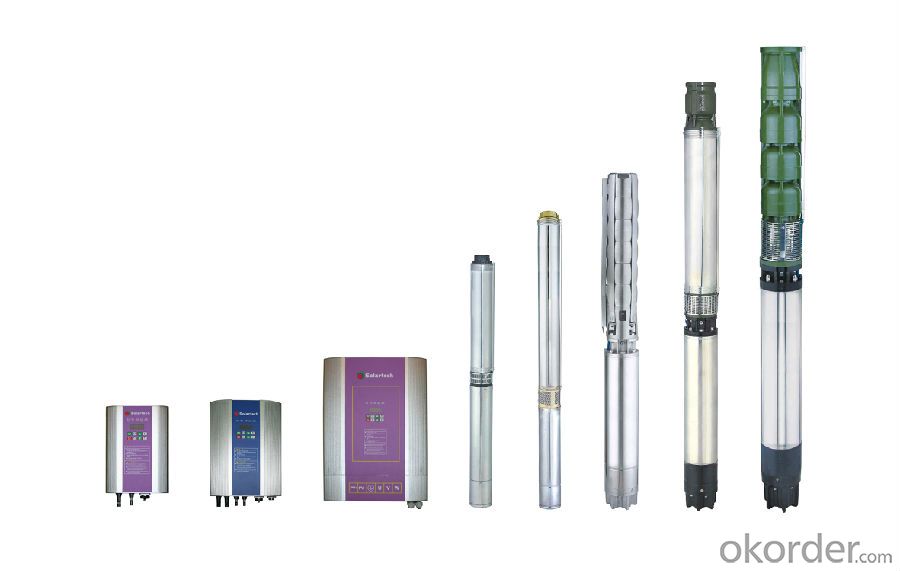
- Q: Can a solar pump system be expanded or upgraded in the future?
- Indeed, a solar pump system possesses the capacity for future expansion or enhancement. These systems are designed with modularity and scalability in mind, enabling effortless expansion to cater to the user's specific demands. To augment the system's power output, one can incorporate supplementary solar panels, thereby facilitating the operation of more pumps or larger pumps. Furthermore, the capacity of the battery bank can be heightened to store surplus energy generated throughout the day for utilization during nighttime or periods of diminished sunlight. Moreover, the control system and monitoring equipment can be upgraded to encompass advanced features, such as remote monitoring and automation. In summary, the adaptability and modularity inherent in solar pump systems ensure their remarkable potential for expansion and enhancement, allowing them to seamlessly conform to evolving requirements and technological advancements in the forthcoming years.
- Q: How does the size of the solar panel affect the performance of a solar pump?
- The size of the solar panel directly affects the performance of a solar pump. A larger solar panel has a higher power output, which means it can generate more electricity to power the pump. This results in increased water flow and pumping capacity, allowing the pump to operate more efficiently and effectively. On the other hand, a smaller solar panel may not be able to generate enough power, leading to reduced performance and potentially lower water output.
- Q: How does a solar pump handle water with high levels of hardness or scaling potential?
- A solar pump is not specifically designed to handle water with high levels of hardness or scaling potential. However, the presence of hard water or scaling potential may affect the performance and longevity of the pump over time. It is recommended to implement proper water treatment measures, such as installing a water softener or using anti-scaling additives, to minimize the impact of hardness or scaling on the solar pump's functionality.
- Q: Can a solar pump be used for fountains or decorative water features?
- Yes, a solar pump can indeed be used for fountains or decorative water features. Solar pumps are designed to operate using energy from the sun, making them a sustainable and eco-friendly option for powering water features. They can provide a constant flow of water, creating beautiful and tranquil displays without the need for electricity or batteries. Additionally, solar pumps are generally easy to install and maintain, making them a popular choice for enhancing the aesthetics of outdoor spaces.
- Q: Can solar pumps be used for water supply in golf courses or sports facilities?
- Yes, solar pumps can be used for water supply in golf courses or sports facilities. Solar pumps are a sustainable and cost-effective solution for irrigation systems, providing a reliable water supply for maintaining the greenery and overall maintenance of such areas. These pumps utilize solar energy to power the pumping mechanism, making them environmentally friendly and reducing operating costs in the long run.
- Q: How does a solar pump handle water with high levels of salinity?
- A solar pump can handle water with high levels of salinity by utilizing a reverse osmosis (RO) system. The RO system effectively removes the salt and other impurities from the water, making it suitable for various purposes such as irrigation or drinking. The solar pump powers the RO system, creating pressure to push the water through a semi-permeable membrane, which separates the salts from the water molecules. As a result, the solar pump ensures that the water being pumped is free from high levels of salinity, providing a reliable and sustainable solution for pumping saline water.
- Q: How does the cost of operating a solar pump compare to a traditional pump?
- The cost of operating a solar pump is generally lower compared to a traditional pump. Solar pumps are powered by renewable energy from the sun, which means they do not require the use of electricity or fuel, resulting in reduced operational costs. Traditional pumps, on the other hand, rely on electricity or fuel, which can be expensive and subject to price fluctuations. Solar pumps have lower maintenance costs as well since they have fewer moving parts and do not require frequent repairs or replacements. In contrast, traditional pumps may require regular maintenance, such as oil changes, belt replacements, or motor repairs, which can add to the overall operating expenses. Additionally, solar pumps are environmentally friendly as they do not emit greenhouse gases or contribute to air pollution, unlike traditional pumps that often rely on fossil fuels. This not only reduces the carbon footprint but also eliminates the need for storing, transporting, and handling potentially harmful substances. While the upfront cost of purchasing and installing a solar pump may be higher than that of a traditional pump, the long-term savings in operating costs, maintenance, and environmental impact make solar pumps a more cost-effective and sustainable option.
- Q: Can a solar pump be used in areas with strict building codes or regulations?
- Yes, a solar pump can be used in areas with strict building codes or regulations. Solar pumps are typically designed to be self-contained and require minimal infrastructure, making them easier to install and comply with regulations. Additionally, solar pumps are environmentally friendly and can help meet sustainability requirements set by building codes. However, it is important to consult with local authorities to ensure compliance with specific regulations in the area.
- Q: Are there any certifications or standards for solar pumps?
- Yes, there are certifications and standards for solar pumps. The most recognized and widely accepted certification for solar pumps is the International Electrotechnical Commission (IEC) 61215 standard, which ensures the quality and performance of photovoltaic modules used in solar pumps. Additionally, some countries and regions may have their own specific certifications or standards for solar pumps to ensure compliance with local regulations and safety requirements.
- Q: What is the maximum suction lift a solar pump can handle?
- The maximum suction lift that a solar pump can handle depends on various factors such as the pump's design, power capacity, and the altitude of the installation site. Generally, solar pumps are capable of handling suction lifts up to 9 meters (30 feet), but it is recommended to consult the pump manufacturer's specifications for accurate information on the maximum suction lift capacity of a specific solar pump model.
Send your message to us
Kusum Solar Pump - DC Solar Pumping Systems Popular Type Good Quality
- Loading Port:
- Shekou
- Payment Terms:
- TT OR LC
- Min Order Qty:
- 10 set
- Supply Capability:
- 6000000 set/month
OKorder Service Pledge
OKorder Financial Service
Similar products
Hot products
Hot Searches
Related keywords





